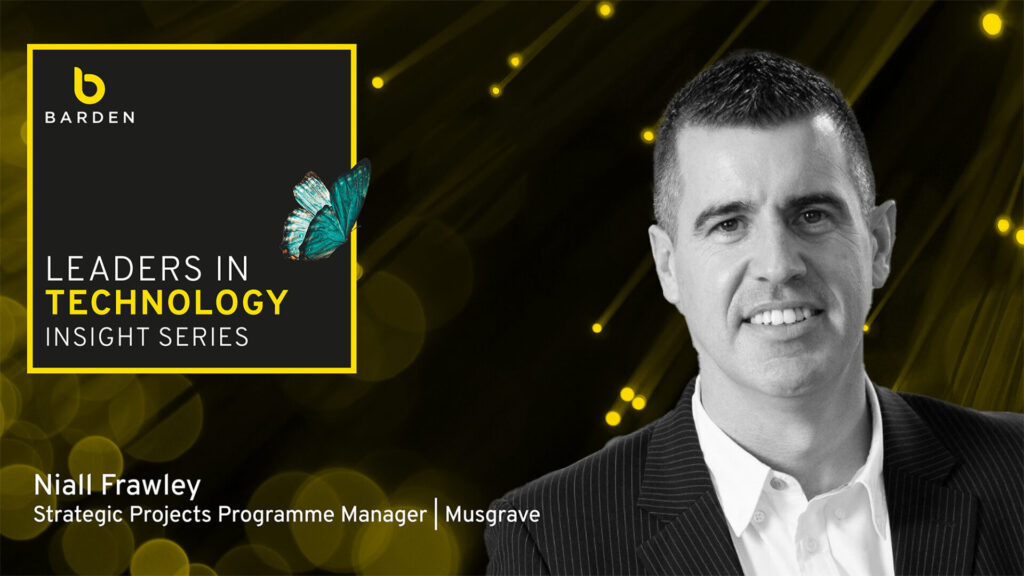Can you tell us a bit about your background and career to date?
I started my career in funds and investment management. Upon moving to Australia, I leveraged my financial services experience to transition into project management roles in FS organisations. Over 10 years, I held several programme and change management roles, including business analysis, project and implementation management, gaining expertise in mergers and acquisitions, and business and IT consultancy. Returning to Ireland, I joined Voxpro (now TELUS International), building out programme delivery governance structures and delivering complex business transformation, including post-acquisition integration. I then worked at the Cork-based consultancy 3SIXTY, aiding businesses in various industries to enhance productivity and efficiency through process and technology change, before joining Musgrave. In my current role, I am overseeing programme delivery and governance structures in the Retail division and leading a strategic programme of work to redesign the operational model at store level, focusing on optimal efficiency without impacting the overall customer experience.
What are your top 3 priorities over the next 18 months?
Transformational Change: Deliver a transformational change at store level by embracing efficient operating processes and utilising best-in-class technology in the retail business. This aims to support efficiency gains at our retailer level to ultimately provide a best-in-class overall customer experience.
Project and Change Delivery: Focus on the project and change delivery structures within the retail division at Musgrave and ensure it is built to support our strategic goals. This includes ensuring best practice approaches are utilised to support all team members involved in project delivery.
Agility & Quality: Strive to be as agile as possible in the fast-moving retail industry, to proactively deliver for customers in a timely manner without impacting the quality of our work.
In your opinion what technologies are likely to be disruptive over the next 18 months?
Use of Data: The retail industry has significantly improved its ability to capture and store data. The next step is to use this data to drive better decision-making across the business, with the ultimate goal of providing a personalised customer experience.
Technology and Automation: Technology and automation that frees people from routine and repetitive tasks will allow them to focus more on customer-facing, value-add activities. This shift can provide the next level of personalisation and an improved customer experience.
AI Tools in Project Management: AI tools can automate the adjustment of project plans and priorities based on parameters set by the project manager. This will free up time to support the team, maintain good communication with stakeholders, and guide the strategic direction of the programme and business.

What types of metrics or KPIs are commonly used by PMOs to measure the success of strategic projects and transformation initiatives? How do PMOs ensure these metrics align with broader business outcomes?
Ultimately, the key KPIs are project completion on time, within budget, and to a high standard of quality. Beyond these, industry-specific KPIs come into play. For example, at Musgrave, our focus is on customer satisfaction. We aim to ensure that our initiatives do not negatively impact the customer. Customers pay a single price for their goods, not multiple times as products move from source to shelf. Therefore, we prioritise customer metrics and optimising our processes without compromising the high quality we deliver.
Another significant consideration is sustainability. While it may not have been a focus five or ten years ago, there has been a significant shift towards measuring how sustainable our practices are. This includes assessing our impact on both customers and the environment. By incorporating sustainability into our KPIs, we align our projects with broader business outcomes and contemporary values. Musgrave’s stated strategy is about reducing our emissions to reach net zero carbon by 2040. By working with our retail partners to make every community a sustainable community and collaborating with suppliers to provide consumers with more sustainable choices. Sustainable solutions are therefore at the core of what we do every day, and we have clear KPIs as part of our change agenda.
In general, how do PMOs approach stakeholder engagement and management to ensure buy-in and support for transformation projects across various teams and departments?
The project manager is often the only person who works full-time on the project, and often as a result they live and breathe the highs and lows of the project lifecycle. So, the one thing I really focus on is context. By giving people the vision of the bigger picture and the context around what we are trying to achieve, everyone can work towards that strategic vision. Even if there are stakeholders who may not agree on all components of the project, once they understand the bigger picture, it then becomes a facts-based decision on how we move forward with it.
What challenges in terms of talent attraction and talent retention are you currently experiencing?
There are a lot of competing opportunities out in the market today, so for many people, it’s less about staying in the one industry/specific type of role as their career progresses. Talent want to be able to move more freely between roles and industries and use their skillset and experience in a more flexible way. The key for us in Musgrave is to create a collaborative, transparent, knowledge-sharing and supportive working environment to attract and retain this talent.
What advice would you give to people who are aspiring to be a Transformation leader?
A Transformation Leader is not necessarily the most knowledgeable person on the team for the topic at hand, that’s the role of subject matter experts. A Transformation Leader is someone who can establish a vision, assemble a team with the right blend of skills that can deliver that vision and guide them through the process. To build yourself into a Transformation Leader, some advice I would give would include:
Broad Experience: Don’t limit yourself to one type of role or focus on one specific industry. The best advice is to build up your skillset by trying different roles across the project and change spectrum. The skills you develop, such as communication, innovation, problem-solving, and leadership, are transferable across various industries. This adaptability and exposure to different ways of working will benefit you as you progress through your career.
Experience Before Certification: Gain experience before focusing on certification. While certification is important, it is more valuable once you have practical experience in a role or industry, allowing you to relate your experiences to the theoretical aspects.
Find A Mentor: Find a good mentor, or several, if possible, to guide your career progression. There is no single linear path to becoming a Transformation leader. Listening to others with lived experiences will help you create your own personal career path. I have found it worthwhile to have mentors who are not my direct managers as they can be a great, objective sounding-board.


 Jump Back
Jump Back

